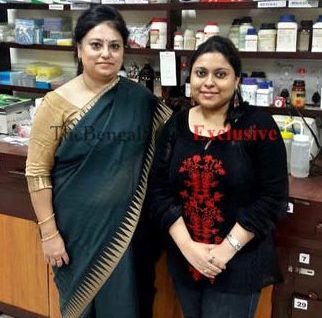Breast cancer is on the rise among women all over the world, especially those aged between 40 and 55 years. There has long been a perception that breast cancer, if detected at an early stage, does not strike again. However, in recent times, a number of studies have shown that some kinds of cancer, especially the triple negative breast cancer, may be cured initially, but there is a high chance that it can strike again.
Four scientists from Kolkata have been working on how and why triple negative breast cancer comes back, and how it can be prevented. The study, initiated by Calcutta University’s Zoology department, was led by the departmental head, prof. Urmi Chattopadhyay. PhD scholar, Pritha Mukhopadhyay, from the same department, is also part of the team. The clinical aspect of the research has been handled by Kolkata’s Thakurpukur Cancer Hospital (Saroj Gupta Cancer Care & Research Institute) director Arnab Gupta and Amity University Vice Chancellor, Prof Dhrubojyoti Chattopadhyay.
The research findings have opened up new vistas in curing breast cancer.
According to prof. Mukhopadhyay, the study has been based on 150 breast cancer patients of Calcutta Medical College and Thakurpukur Cancer Hospital. Out of the 150 patients, 50 per cent were suffering from triple negative breast cancer. The finding was also indicative of the high rate of triple negative breast cancer among patients from West Bengal and Bangladesh.
What exactly is the triple negative breast cancer?
According to the researchers, estrogen, progesterone and HER2 play a very important role in breast cancer. If the result of one or two of these hormone receptors is negative, then it is possible to cure the breast cancer through hormone therapy. However, if the results of all three are negative, then it is identified as a case of triple negative breast cancer, and in such cases hormone therapy cannot work. Doctors then take resort to chemotherapy.
Urmi Chattopadhyay, who heads the team of researchers, said that even after breast cancer is completely cured through chemotherapy, there remains a high chance of the cancer striking again after five to nine years. In case it happens a second time, the cancer gets tough to handle this time.

But why does it strike again?
According to Pritha Mukhopadhyay, though the cancer cells die due to chemotherapy, the “cancer stem cells” remain. And it is from here that the future cancer can germinate. The researchers’ findings show that out of the 150 women’s case studied, in 15-20 per cent cases, the patients have been diagnosed with breast cancer for a second time after some years. In five to eight per cent cases, cancer was detected in survivors other than in breasts, which makes it all the more complicated.
What then is the remedy? How to stop the cancer from coming back? That is the main premise of the researchers’ work.
According to their published research work, the cancer afflicted stem cells grow their own defence mechanism to fight chemotherapy. That’s exactly how and why the stem cells can strike again, even though it seems they have been completely eliminated through chemotherapy. The cells can even multiply in future. Two kinds of protein – the ABCG2 and the TWIST1 – are primarily responsible for this. These proteins are “controlled” by the SOX2 gene in the cancer-afflicted cells. Thus, it is the ABCG2, TWIST1 and SOX2 that work together to overcome the impact of the chemotherapy, making the cancer stem cells “come alive” in future. That’s how it may either strike as breast cancer again or can be transmitted to some other part of the body through blood vessels.
The research paper shows the way out of this apparent quagmire. The researchers claim that it is possible to lower the impact of the sox2 gene through “gene targeting”. They have achieved success by using the “gene silencing” process through RNA – a gene silencing method. If the sox2 reduces in number, then ABCG2 and TWIST1 will also lose its impact and they can’t reduce the impact of the chemotherapy drugs in the body, says Mukhopadhyay.
In that case, chemotherapy drugs such as Paclitaxel can work more effectively. There are attempts to bring the RNA (through which the gene silencing is being conducted) in the form of injection and oral medicine, say the researchers.
The findings of the four Kolkata based researchers was published recently in the Nature’s Scientific Reports section. It has opened up new avenues for cancer cure in future.
Cover: Pritha Mukhopadhyay and Urmi Chattopadhyay

